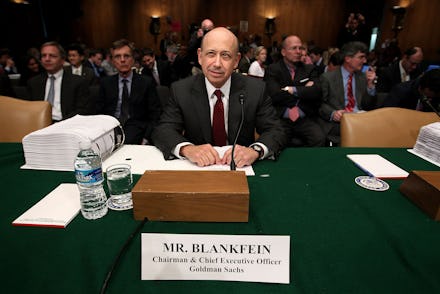The CEO of Goldman Sachs Finally Admitted the Obvious Fact the Rest of Us Already Knew

The news: One of the richest men in America has finally conceded that income inequality is a problem.
Goldman Sachs CEO and Chairman Lloyd Blankfein told CBS in an interview last week that wealth distribution in America needs fixing. "It's a very big issue and something that has to be dealt with," said the man who made $20 million in 2013 alone and has a net worth of approximately $450 million.
Blankfein is right, but he's missing something. Income inequality in the United States is an enormous problem. In fact, it's at its highest point since 1928. As of 2012, we're at the apex of disproportion: The top 1% is raking in 22.5% of pre-tax income, while the bottom 90% represents less than half (49.6%) of national income for the first time this century.
What Blankfein fails to address, however, is his part in the crisis. He suggests that legislation is the way to fix everything, which skirts around the bigger issue: The greed and gluttony of Wall Street that necessitated any political intervention at all.
Image Credit: Dorsey Shaw
What's with the silence? Blankfein himself had quite a humble upbringing, so it's odd that it took him this long to address the issue publicly. He's no stranger to the struggles of everyday Americans — his father was a postal worker, and he told NPR that he learned the value of a dollar working the concession stands of Yankee Stadium.
Blankfein has also leaned left in the past; he has described himself as a Democrat and has expressed support for gay marriage. He's also donated to Democratic candidates like Hillary Clinton and Chris Dodd. But in a peculiar twist, he eventually stopped donating to such candidates and did a 360, donating $5,000 to Eric Cantor's PAC in 2012.
Video Credit: CBS
The silence may have been deliberate. The shift away from the left may have been rooted in business, as democratic legislators began going after bankers more aggressively in the years following the recession. This wasn't for nothing: Goldman Sachs has a checkered past full of allegations of corruption, backroom dealing and unethical business practices. Journalist Matt Taibbi once described it as "a great vampire squid wrapped around the face of humanity."
These accusations were brought to the forefront in 2008, when the housing bubble burst and the economy went down the tube. Yet despite the carnage, Goldman managed to earn almost $20 billion before tax in 2009, a year in which most of its competition had been wiped off the map by the financial crisis.
At the heart of the public debate was whether or not Goldman had acted ethically in its navigation of the economic meltdown. While the company was betting against mortgage backed securities, it was also selling them to its customers to make a profit. Though it was technically correct in its assumption that these commodities were way overvalued, its decision to begin "mark[ing] them down aggressively" only magnified the competition's collapse further down the road, which in turn hastened the economic recession that battered the middle and lower classes.
So while everybody else was floundering — massive companies and individual Americans alike — Goldman was flush with cash from grey-area moral practices and no one profited more from this than Blankfein.
Image Credit: Washington Post
The takeaway: Blankfein shouldn't be begrudged for his acknowledgement that inequality exists. He seems to be aware that things are bad (and only getting worse), commenting in the interview that "If you grow the pie but too few people enjoy the benefits of it, the fruit, then you'll have an unstable society."
But pointing out a problem without truly acknowledging your company's (and by extension, your own) part in it strikes the wrong chord. Blankfein is a caricature of the very demographic he's criticizing. With his wealth and power, his feet are firmly planted in 1% territory. So, although his admission might yield a round of applause from some, it barely amounts to a tiny squeak at a time when we desperately need a chorus of roars.